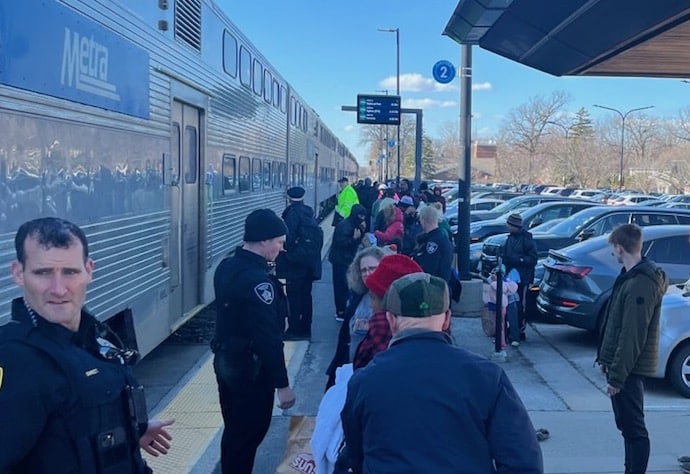
Wilmette limits when buses can arrive amid surge in migrant dropoffs
With a decision Wednesday night, the Village of Wilmette became the latest North Shore community to implement restrictions on migrant bus dropoffs.
The Village Board of Trustees unanimously passed bus regulations on Wednesday, April 24, following discussion and more than an hour of commentary from residents.
While Highland Park, Winnetka and Glencoe all passed their own ordinances earlier this year, Wilmette held off on any potential restrictions. But after a recent surge in migrant bus arrivals that officials expect to continue, Village staff recommended an ordinance to regulate the dropoffs.
Village Manager Mike Braiman said on Wednesday that 68 buses from Texas have dropped off more than 2,700 migrants at the Wilmette Metra station 722 Green Bay Road, since the beginning of the year.
Braiman said that while the “vast majority” of dropoffs have been orderly, several have happened during overnight hours. According to data shared by Braiman in a memo to the board, as of April 17, a total of 36 buses arrived between 4:30 p.m. and 9 a.m.
Braiman said because of reduced staffing from the Wilmette Police Department overnight, and to “ensure compassion, dignity and respect,” the ordinance was put forward.
Wilmette’s ordinance restricts dropoff hours to between Monday through Friday between 8 a.m. and 4:30 p.m. It also designates the Wilmette Metra station as the dropoff location and creates fines — ranging from between $50-$750 per passenger to impoundment of the bus — for violations of the ordinance.
It also requests, but does not require, advance notice of dropoffs. Other municipalities have mandated advance notice.
Public response
Exactly 30 people shared their thoughts on the ordinance with Wilmette trustees on Wednesday. The comments ranged from support for the measure to opposition of it to requests for further restrictions.
While at times Village President Senta Plunkett had to interject to quiet the audience or a speaker, public commentary was civil. Some who made comments said they were volunteers who have helped support arriving migrants by providing care packages of clothing, snacks, toiletries and more; though, their opinions of the ordinance varied.
Heather Oliver, who, along with Debora Morris, has been leading efforts to support migrants, asked trustees to vote for the ordinance. She said buses have dropped off migrants at 1 a.m. and 5 a.m., sometimes leaving them unattended at the station.
“The proposed ordinance with a time limit on the buses will allow migrants to arrive early in the City of Chicago so they can receive services … and not have to be put on warming buses overnight,” Oliver said. “The Wilmette police will be able to better manage the safety of the migrants at the Metra station when the buses arrive, as well as serving and protecting the residents of Wilmette.”
While he believed the measure could include stricter penalties for bus drivers who violate the rules, resident Michael Lieber called the ordinance a “very good balance.”
“Regardless of how you feel about whether migrants should be brought here, whether they should come, what I think we can all agree on is that it’s not right for people to be dropped off at 2:30 in the morning when the next train isn’t for two and a half, three hours,” he said. “No place is open to eat, no place is open to use the restroom, it might be inclement weather. That’s not right and it’s not fair.”
Some speakers said they were concerned that the arrival of migrants would lead to an increase in crime. Following public comment, Braiman said that there have been no reported crime incidents connected to migrants in Wilmette.
Opponents of the ordinance mostly shared the same concern: that passing it would lead to bus drivers no longer stopping in Wilmette and just finding a town that does not have any restrictions.
Resident Jeff Axelrod said that while he understands the Village’s logistical concerns, he doesn’t understand why it’s become an issue now.
“Compared to the immense hardships and inconveniences many of these refugees have faced in fleeing violence and poverty in their home countries, the minor inconveniences experienced by our affluent community ring trivial,” he said. “The least we can do is maintain Wilmette’s welcoming status rather than handing these buses off to unprepared neighbors.”
Dr. Monica Rodriguez, a Northwestern University faculty member, said she was concerned about the message that the ordinance was sending and encouraged trustees to be welcoming to migrants.
“I do hope that you consider the effect of the message that the ordinance will provide, which is one, I think, which is highly anti-immigrant,” she said. “I urge you to think about the ways in which Wilmette can do more for our incoming guests into Wilmette.”
Cook County Commissioner Scott Britton, whose district includes Wilmette, voiced his support for the ordinance Wednesday while also addressing some concerns by those who were against it.
“Is it possible that they’re going to go to a different town like (Glenview)? There’s two train stations there,” he said. “Absolutely. It could happen. But you have to make a decision today, and it certainly seems to me that this is a reasonable accommodation.”
Britton also offered any assistance he could provide, including mentioning $20 million the county has set aside that he said could be used to reimburse any municipalities if requested.
“I support your decision, and anything I can do and have done with your excellent village manager and this board I will do,” he said.
Trustees thoughts
Discussion among trustees was brief, and many shared similar thoughts.
Plunkett said nobody in the Village could have foreseen the challenges with bus dropoffs, “and I think the Village and our police department have handled an unexpected and challenging situation with professionalism and compassion.”
She went on to say that the village board’s role is to ensure all residents receive effective municipal services, including police, “while treating all persons with dignity and respect.”
“For those reasons, with the information that’s available to us right now, I believe this ordinance is reasonable,” Plunkett said, “I believe it’s reasonable and I believe it’s compassionate.”
She added that it will help alleviate pressure on the Wilmette Police Department.
“The limitations on timing of unscheduled dropoffs in this ordinance ensures that our Police Department can adequately support bus passengers and respond to emergency calls for service while giving new arrivals a better opportunity to quickly access services offered by the City of Chicago.”
Plunkett also thanked those who have helped the migrants.
“I am so grateful for the outpouring of generosity from our community, and from the extraordinary efforts of volunteers as well as our police department, who have managed this with professionalism and care.”
Trustee Kathy Dodd added that if there end up being complications with the ordinance, it can always be amended.
“If this doesn’t pan out exactly how we want, I am confident in our staff, I’m confident in our president, and I’m confident in every single one of us that we will revisit this if we need to,” Dodd said. “So please have patience with us, please understand we’re trying to do the right thing, and please support what we’re trying to do here tonight.”
The Record is a nonprofit, nonpartisan community newsroom that relies on reader support to fuel its independent local journalism.
Subscribe to The Record to fund responsible news coverage for your community.
Already a subscriber? You can make a tax-deductible donation at any time.

Peter Kaspari
Peter Kaspari is a blogger and a freelance reporter. A 10-year veteran of journalism, he has written for newspapers in both Iowa and Illinois, including spending multiple years covering crime and courts. Most recently, he served as the editor for The Lake Forest Leader. Peter is also a longtime resident of Wilmette and New Trier High School alumnus.


